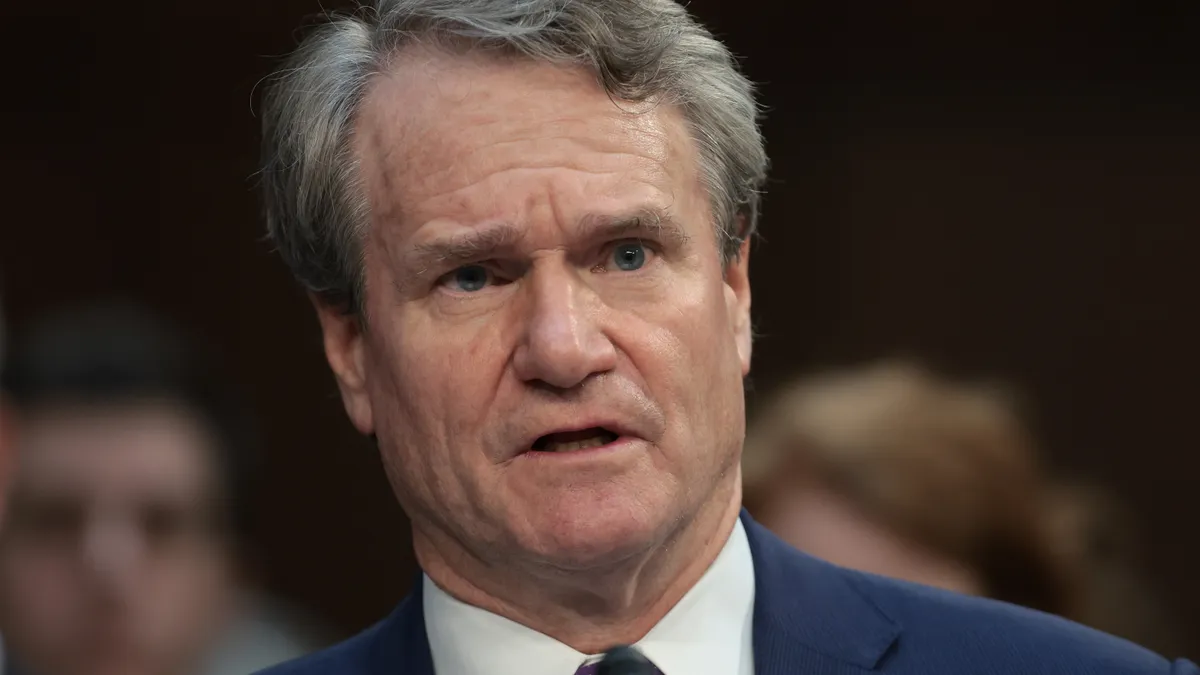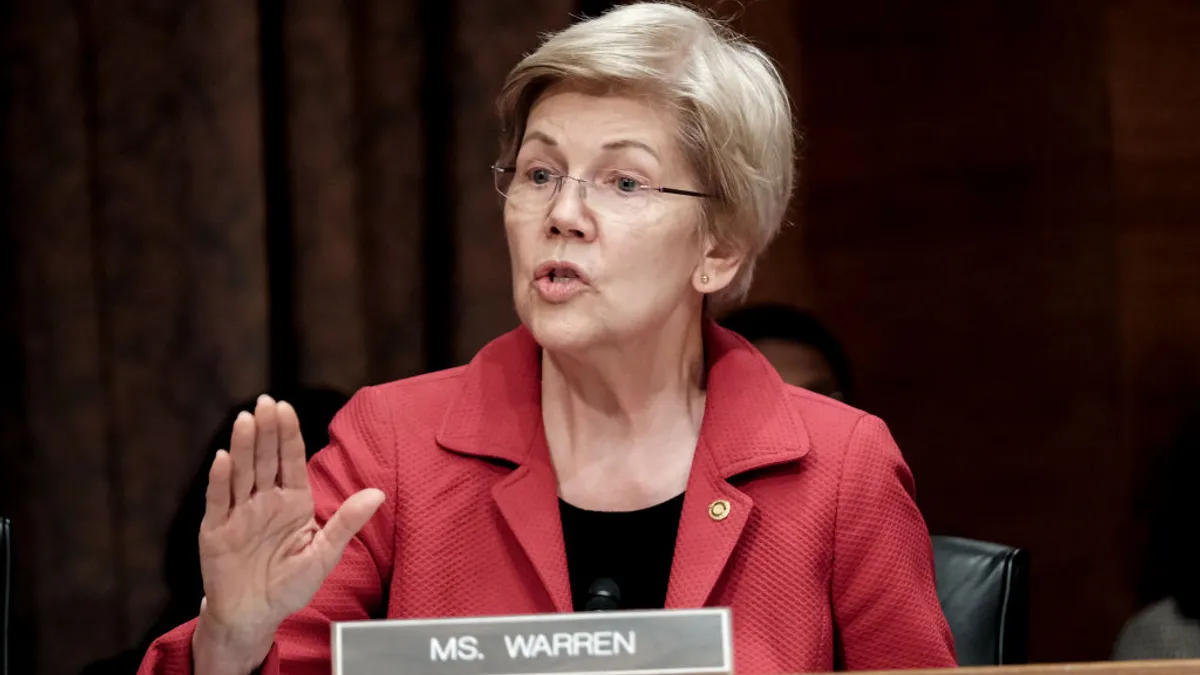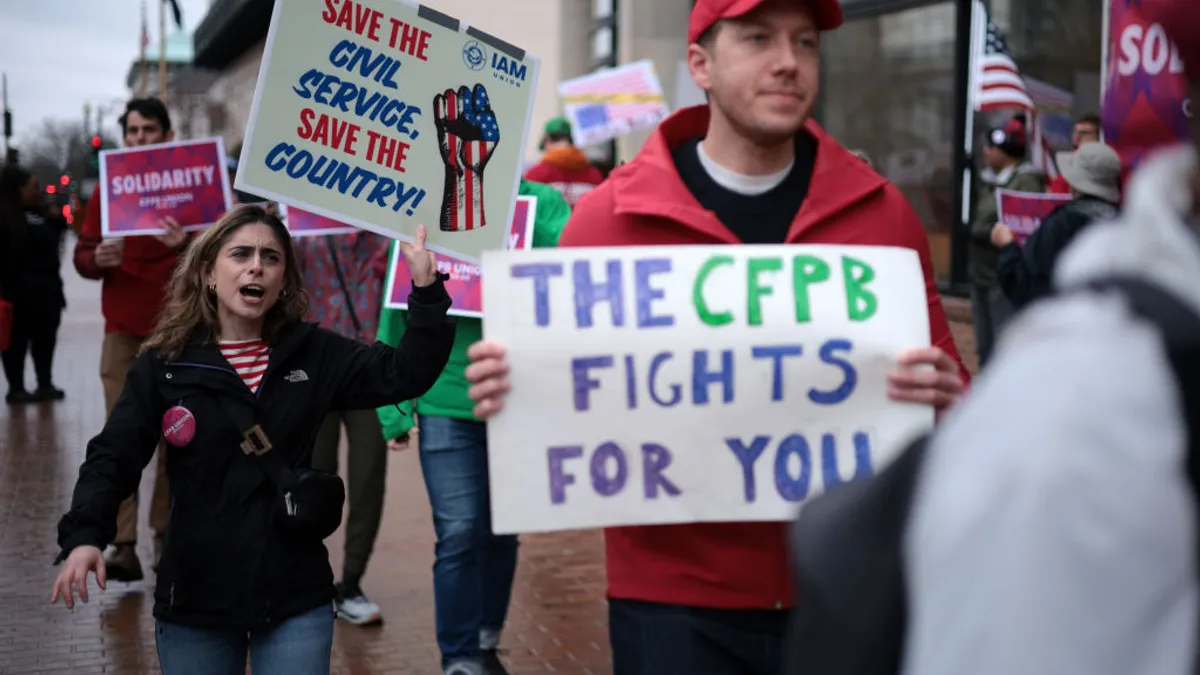President Donald Trump on Thursday called out Bank of America for allegedly failing to do business with conservatives.
The accusation came as an aside during Trump’s virtual appearance at the World Economic Forum in Davos, Switzerland. Bank of America CEO Brian Moynihan, on stage during a Q&A session, asked Trump how the wave of executive orders he issued this week might affect efforts to grow the gross domestic product, reduce inflation and boost stock prices.
“You’ve done a fantastic job, but I hope you start opening your bank to conservatives, because many conservatives complain that the banks are not allowing them to do business within the bank, and that included a place called Bank of America,” Trump said. “I don’t know if the regulators mandated that because of [former President Joe] Biden or what, but you and [JPMorgan Chase CEO] Jamie [Dimon] and everybody, I hope you’re going to open your banks to conservatives because what you’re doing is wrong.”
Moynihan did not comment on Trump’s accusation in the moment but laughed uncomfortably and changed the subject, thanking Trump for helping to bring the 2026 World Cup, which Bank of America is sponsoring, to the U.S.
A Bank of America spokesperson said Thursday the bank “serve[s] more than 70 million clients and we welcome conservatives.”
“We will be engaging with the administration and Congress regarding the extensive government regulations that sometimes result in decisions to exit client relationships,” the spokesperson said. “We never close accounts for political reasons and don’t have a political litmus test.”
A JPMorgan spokesperson said the bank “follow[s] the law and guidance from our regulators and have long said there are problems with the current framework Washington must address.”
“We have never and would never close an account for political reasons, full stop,” the spokesperson said.
Dimon backed that up in a podcast appearance this week. “We have not de-banked anyone because of political or religious relationships, period,” he said, according to Reuters. “Now, when we de-bank someone, they often blame that reason, but that’s not a reason.”
The Senate Banking Committee is planning a hearing on the de-banking issue in February, according to The Wall Street Journal.
AGs’ accusations
Bank of America last April weathered – and countered – allegations from 15 Republican attorneys general that it “appears to be conditioning access to its services on customers having the bank’s preferred religious or political views.”
“Your discriminatory behavior is a serious threat to free speech and religious freedom, is potentially illegal, and is causing political and regulatory backlash,” Kansas Attorney General Kris Kobach wrote to Moynihan. “Your bank needs to be transparent with and assure us, its shareholders, and others that it will not continue to de-bank customers for their speech or religious exercise.”
The bank rebutted in a May letter of its own that it maintains banking and investing relationships with roughly 120,000 faith-based clients in the U.S.
“Religious beliefs or political view-based beliefs are never a factor in any decisions related to our client’s accounts,” the bank wrote in May, according to CNBC.
Rather, the bank said, accounts are de-banked for reasons including a change of stated purpose of the account, the expected level or type of activity on the account or failure to verify certain documentation required by law.
Beyond faith, Kobach in April accused Bank of America of denying services to firearms manufacturers, fossil-fuel producers, private prisons and other clients.
Financing decisions
Indeed, Bank of America and Citi both agreed in 2018 to stop financing the operations of certain firearms manufacturers after a high school shooting in Parkland, Florida, left 17 students and staff dead.
Similarly, BofA and several of its peers sought, during Trump’s first presidential term, to divest themselves from financing private prisons as attention focused on immigrant detention centers along the U.S.’s southern border – and the banks that financed them.
But the bank more recently tweaked the language of its environmental and social risk policy, potentially backpedaling on firearms and energy restrictions.
The June 2022 version of the bank’s environmental and social risk policy framework read, “We have determined that we are currently unable to engage in the following activities based on the appropriate application of our Risk Framework and enhanced due diligence.”
A December 2023 update, though, doesn’t contain the “unable to engage” language for certain activities, instead indicating business is taken on a case-by-case basis.
“Any client relationship or transaction related to the below areas must go through an enhanced due diligence process and be escalated to the senior-most risk review body of the applicable line of business for decisioning,” it reads.
More directly, de-banking surfaced as a Republican talking point around the time of the 2024 election. Andreessen Horowitz co-founder Marc Andreessen accused certain banks of de-banking crypto executives as clients and posted on X that “the President’s own wife and son were de-banked.” Andreessen appeared on the Joe Rogan podcast in November, asserting he knows 30 tech company founders who had been “de-banked in the past four years.”
De-banking can hold severe consequences for lenders, in some cases. Alison Rose, onetime CEO of U.K.-based NatWest resigned in 2023 after discussing, with a journalist, the bank’s decision to close the account of Brexit supporter-turned-pundit Nigel Farage.
Trade group backing
At least one banking trade group, the Bank Policy Institute, aligned Thursday with Trump’s “diagnosis that much debanking occurs as a result of an anti-money laundering and ‘reputational risk’ regime administered by the federal banking agencies where certain types of customers are designated as ‘high risk.’”
“Over 5,000 government examiners administer this regime, and pressure banks to defend retention of any ‘high risk’ customer and expend extraordinary resources monitoring those accounts,” BPI’s CEO, Greg Baer, said in a statement Thursday. “These examiners operate in secret, without checks and balances, and banks that deviate from their directives risk severe fines and penalties.”
JPMorgan’s spokesperson, likewise, said Thursday the bank welcomes “the opportunity to work” with Trump and Congress “on ways to remove regulatory ambiguity while maintaining our country's ability to address financial crime."
“There should be far cleaner lines about what we have to do and don’t have to do,” Dimon said on this week’s podcast. “We’ve been complaining about this for years. We need to fix it.”
Investors, historically, have been less swayed by the issue.
A Bank of America shareholder resolution last year aimed to force the bank to report on "risks of politicized de-banking." The measure received just 3% support.
Raymond James analyst Ed Mills, however, asserted Trump’s BofA barb may be a flare to the banking sector at large.
"These comments could be early indicators that expansion of [banks’] business to cover some of his preferred industries would be welcomed," Mills wrote Thursday in a note seen by Reuters.



















